- Home
- Holly Black
Zombies vs. Unicorns Page 10
Zombies vs. Unicorns Read online
Page 10
Then …
Then add magic. I don’t know how you will do this if you have not seen it; I myself only saw it the once, and bugger me if I can describe it, the quality that tells you a thing is bespelled, or sorcerous itself. It is luminosity of a kind, cool but strong. All-encompassing and yet very delicate, it trickles in your bones; slowly it lifts the hairs on your legs, your arms, your chest, in waves like fields of high-grown grass under a gentle wind. And it thins and hollows the sounds of the world, owl hoots and rabbit scutters, and beyond them it rumors of vast rustlings and seethings, the tangling and untangling of the workings of the universe, this giant nest of interminable snakes.
When something like this appears before you, let me tell you, you must look at it; you must look at nothing else; your eyes are pulled to it like a falcon to the lure. Twinned to that compulsion is a terror, swimming with the magic up and down your bones, of being seen yourself, of having the creature turn and lock you to its slavery forever, or freeze you with its gaze; whatever it wishes, it might do. It has the power, and you yourself have nothing, and are nothing.
It did not look at me. It turned its fine white head just a touch my way, then tossed its mane, as if to say, How foolish of me, even to notice such a drab being! And then it moved off, into the trees at the far side of the clearing.
The rhythm of its walking beat in my muscles, and I followed; the sight of it drew me like pennants and tent tops on a tourney field, and I could not but go after. Its tail, at times, braided flowers into itself, then plaited silver threads down its strands, then lost those also and streamed out like weed in brook water. Its haunches were pearly and moony and muscular. I wanted to catch up to its head and ask it, ask it … What impossible thing could I ask? And what if it should turn and answer—how terrible would that be? So, all confusion, I stumbled after, between the flowers of the forest, across their carpet and among their curtains and beneath their ribbons and festoons.
We came to a streamside; the creature led me into the water, stirring the stars on the surface. And while I watched a trail of them spin around a dimple left by its passing, it vanished—whether by walking away, or by leaping up and becoming stars itself, or by melting into the air, I could not say, but I was standing alone, in only starlight, my feet numb and my ankles aching with the water’s snowmelt cold.
I stepped out onto the muddy bank; it was churned with many hoofprints, all unshod that I could distinguish. There was no magic anywhere, only the smell of the mud and of wet rock, and behind that, like a tapestry behind a table, of the forest and its flowers.
Something lay higher up the bank, which the horse had fetched me to see. It was a person’s body; I thought it must be dead, so still did it lie.
Another smell warned me as I walked closer on my un-numbing feet, on the warm-seeming mud, where the trampled grass lay bruised and tangled. It was not the smell of death, though. It was a wild smell, exciting, something like the sea and something like … I don’t know, the first breath of spring, perhaps, of new-grown greenness somewhere, beckoning you across snow.
It was a woman—no more than a girl—and indecent. Lace, she wore, a lace-edged under-dress only, and the lace was torn so badly about her throat that it draggled, muddily, aside and showed me her breast, that gleamed white as that horse’s flank, with the bud upon it a soft round stain, a dim round eye.
Where do I begin with the rest of her? I stood there stupidly and stared and stared. Her storm-tossed petticoats were the finest weavings, broiderings, laces I had seen so close. Her muddied feet were the finest formed, softest, whitest, pitifullest feet I had laid eyes on in my life. The skirts of the underclothes were wrenched aside from her legs, but not from her thatch and privates, only as far as the thigh, and there was blood up there, at the highest place I could see, some dried and some shining fresher.
Her hair, my God! A great pillow of it, a great swag like cloth, torn at the edges, ran its shreds and frayings out into the mud. It was dark, but not black; I thought in proper light it might show reddish lights. Her face, white as milk, the features delicate as a faery’s, was cheek-pillowed on this hair, the open lips resting against the knuckle and nail of one thumb; in her other hand, as if she were in the act of flinging it away, a coronet shone gold, and with it were snarled a few strands of the hair, that had come away when she tore the crown from her head.
I crouched a little way from this princess, hissing to myself in awe and fright. I could not see whether she breathed; I could not feel any warmth off her.
I stood and tiptoed around her, and crouched again, next to the crown. What a creation! I had never seen such smithing or such gems. You could not have paid me enough to touch the thing, it gave off such an atmosphere of power.
I was agitated to make the girl decent. I have sisters; I have a mother. They would not want such fellows as those back at the fire to happen on them in such a state. I reached across the body and lifted the lace, and the breast’s small weight fell obedient into the pocket and hid itself. Then, being crouched, I waddled most carefully down and tried to make sense of the lace and linen there, not wanting to expose the poor girl further with any mistaken movement of the wrong hem or tatter. I decided which petticoat piece would restore her modesty. I reached out to take it up with the very tips of my fingers.
A faint step sounded on the mudded grass behind me. I had not time to turn. Four hands, strong hands, the strongest I had ever felt, caught me by my upper arms and lifted me as you lift a kitten, so that its paws stiffen out into the air, searching for something to grasp.
“We have you.” They were soldiers, with helmets, with those sinister clipped beards. They threw me hard to the ground away from the princess, and the fence they formed around me bristled with blades. Horror and hatred of me bent every back, deformed every face.
“You will die, and slowly,” said one in deepest disgust, “for what you done to our lady.”
They took me to the queen’s castle and put me in a dungeon there. Several days they kept me, on water-soup and rock-bread, and I was near despair, for they would not tell me my fate nor allow me to send word to any family, and I could well imagine I was to spend the rest of my days pacing the rough cell, my brief time in the colorful out-world replaying itself to madness in my head.
Guards came for me, though, the third day. “Where are you taking me?” I said.
“To the block, man,” said one.
My knees went to lily stalks. The other guard hauled me up and swore. “Don’t make trouble, Kettle,” he told his fellow. “We don’t want to bring him before them having shitted himself.”
The other chuckled high, and slapped my face in what he doubtless thought a friendly way. “Oh no, lad, ’tis only a little conference with Her Majesty for you. A little confabulation regarding your misadventures.” Which was scarcely less frightening than the block.
From the stony under-rooms of the castle, up we went. The floor flattened and the walls dried out and we passed the occasional terrifying thing: a suit of armor from the Elder Days; a portrait of a royal personage in silks bright as sunlit water, in lace collars like insect wings; a servant with a tray with goblets and decanter so knobbed and bejeweled you could scarce tell what they were.
“Here’s the place,” said the humorous guard as we arrived at a doorway where people were waiting, gentlemen hosed and ruffed and cloaked, with shining-dressed hair, and two abject men about to collapse off that bench, they leaned so spineless and humiliated.
The guards at the door let us straight in, to a room so splendid, I came very close to filling my pants. It was all hushed with the richest tapis, and ablaze with candles, and God help me, there was a throne, and the queen sat upon it, and at the pinnacle of all her clothing, all her posture, above her bright, severe eyes and her high forehead filled with brains, a fearsome crown nestled so close in her silvering reddish hair, it might have grown into place there. Under her gaze my very bones froze within me.
“Give your
name and origins,” said the guard, nudging me.
“My name is Manny Foyer, of Piggott’s Leap, Your Majesty.”
“Now bow,” the guard muttered.
I bowed. Oh, my filthy boots were sad on that bright carpet! But I would rather have looked on them than on that royal face.
“Daughter?” The queen did not take her attention from my face.
I gaped. Was she asking me if I had a daughter? Why would she care? Had she confused me with some other offender?
But a voice came from the shadows, beside, behind the throne. “I have never seen him in my life. I don’t know why he has been brought here.”
The queen spoke very slowly and bitterly. “Take a close look, daughter.”
Out of the shadows walked the princess, tall and splendidly attired, her magnificent hair taken up into braids and knots and paddings so elaborate, they almost overwhelmed her little crown. Her every movement, and her white fine-modeled face, spoke disdain—for me, for her mother, for the dignitaries and notables grouped about in their bright or sober costumes, in their medals and accoutrements or the plainer cloaks of their own authority.
She circled me. Her gown’s heavy fabrics rustled and swung and shushed across the carpet. Then she looked to her mother and shrugged. “He is entirely a stranger to me, Madam.”
“Is it possible he rendered you insensible with a blow to your head, so that you did not see his face?”
The princess regarded me over her shoulder. She was the taller of us, but I was built stockier than her, though almost transparent with hunger at this moment.
“Where is my constable? Where is Constable Barry?” said the queen impatiently, and when he was rattled forth behind me, “Tell me the circumstances of this man’s arrest.”
Which he did. I had my chance to protest, when he traduced me, that I had not touched the lady, that I had only been adjusting her clothing so that my fellows would not see her so exposed. I thought I sounded most breathless and feeble, but while the constable continued with his story, I caught a glance from the princess that was very considering of me, and contained some amusement, I thought.
There was a silence when he finished. The queen dandled my life in her hands. I was near to fainting; a thickness filled my ears, and spots of light danced at the edges of my sight.
“He does not alter your story, daughter?” said the queen.
“I maintain,” said the magnificent girl, “that I am pure. That no man has ever touched me, and certainly not this man.”
The two of them glared at each other, the coldest, most rigid-faced, civilized glare that ever passed between two people.
“Free him,” said the queen, with a tiny movement of her finger.
Constable Barry clicked his tongue, and there was a general movement and clank of arms and breastplates. They removed me from that room—I dare say I walked, but truly it was more that they wafted me, like a cloud of smoke that you fan and persuade toward a chimney.
They put me out the front of the castle, with half a pound-loaf of hard bread to see me home. It was raining, and cold, and I did not know my way, so I had quite a time of it, but eventually I did find my road home to Piggott’s, and into the village I tottered late next day.
My mam welcomed me with relief. My dad wanted my word I had done no wrong before he would let me in the house. My fellows, farm men and hunters both, greeted me with such ribaldry I scarce knew where to look. “I never touched her!” I protested, but however hard I did, still they drank to me and clapped my back and winked at me and made unwholesome reference. “White as princess skin, eh, Manny?” they would say, or, “Oh, he’s not up for cherry-picking with us, this one as has wooed royalty!”
“Take no notice, son,” Mam advised. “The more you fuss, the longer they will plague you.”
And so I tried only to endure it, though I would not smile and join in their jesting. They had not seen her, that fine girl in her a-mussment; they had not been led to her through the flowering forest by a magical horse with a horn in its head; they had not quailed under her disdain, or plumped up again with hope when she had looked more kindly on them. They had not been in that dungeon facing their deaths, nor higher in the palace watching the queen’s finger restore them to life. They did not know what they spoke of so lightly.
I thought it all had ended. I had begun to relax and think life might return to being more comfortable, the night Johnny Blackbird took it into his head to goad me. He was a man of the lowest type; I knew even as I swung at him that Mam would be disgusted—Dad also—by my having let such an earwig annoy me with his crawlings. But he had gone on and on, pursuing me and insisting, full of rude questions and implications, and I was worn out with being so fecking noble about the whole business, when I had never asked to be led away and put beside a princess. I had never wanted picking up by queen people and bringing into royal presences. Most of all, I had not wanted, not for a moment, to touch even as much of her clothing as I touched, of that young lady, let alone her flesh. I had never thought a smutty thought about her, for though she were a beauty she were much too imposing for a man like me to do more than bow down before, to slink away from.
Anyway, once I had landed my first thump, to the side of Blackbird’s head, the relief of it was so great, I began to deliver on him all the blows and curses I had stored up till that moment. And hard blows they were, and well calculated, and curses that surged like vomit from my depths, so sincere I hardly recognized my own voice. He called pax almost straightaway, the little dung piece, but I kept into him until the Pershron twins pulled me off, by which time his face was well colored and pushed out of shape, the punishment I’d given him.
After that night people left me alone, and rather more than I wanted. They respected me, though there was the smell of fear, or maybe embarrassment—bad feeling, anyhow—in their respect. And I could not jolly them out of it, having never been that specimen of a jolly fellow. So I tended then to gloom off by myself, to work when asked and well, but less often to join the lads at the spring for a swim, or at the Brindle for a pot or two.
We were stooking early hay when the soldiers came again. One moment I was easy in the sunshine, watching how each forkful propped and fell; the next I came aware of a crowding down on the road, like ants at jam, and someone running up the field—Cal Devonish it was, his shirt frantic around him. As soon as he was within the distance of me, he cried, “They are come for you, Manny!” And I saw my death in his face, and I ran too.
The chase was messy and short. I achieved the forest, but I was not long running there before my foot slipped on a root, then between two roots, and the rest of my body fled over it and the bone snapped, above my ankle. I sat up and extricated myself, and I was sitting there holding my own foot like a broken baby in both my hands, knowing I would never run again, when the soldiers—how had they crossed the hay field so fast?—came thundering at me out of the trees.
“What have I done?” I cried piteously. They wrenched me up. The leg pain shouted up me, and flared off the top of my head as screams. “’Tis no less true now, what I said, than it was in the spring!”
“Why did you run, then,” said one of them, “if you are so innocent?” And he kicked my broken leg, then slapped me awake when I swooned from the pain.
Up came Constable Barry, his face a creased mess of disgust and delight. “You filth.” He spat in my face; he struck me to the ground. “You animal.” He kicked me in my side, and I was sure he broke something there. “Getting your spawn upon our princess, spoiling and soiling the purest creature that ever was.”
“But I never!”
But he kicked me in the mouth then, and thank God the pain of that shatterment washed straight back into my head, and wiped his ugly spittle-face from my sight, and the trees and the white sky behind it.
Straight up to the foot of the tower he rode, the guard. He dismounted jingling and untied a sacking bag from his saddle. It was stained at the bottom, dark and plentifully.
>
“You have someone in that tower, I think, miss,” he says to me. “A lady?”
“We do.” I could not tear my gaze from the sack.
“I’m charged to show her something, and take her response to the Majesty.”
“Very well,” I said.
He followed me in; I conveyed his purpose to Joan Vinegar.
“Oh, yes? And what is the thing you’re to show?” And she stared at the bag just as I had, knowing it were some horror.
“I’m to show the leddy. I’ve no instructions to let anyone else see.”
“I’ll take you up.” Joan was hoping for a look anyway. So was I. He was mad if he thought we would consent to not see. Nothing ever happened here; we were hungry for events, however grim.
Up they went, and I walked back outside, glanced to my gardening and considered it, then followed my musings around to the far side of the tower, under the arrow slit that let out of the lady’s room.
It was a windless day, and thus I heard clearly her first cry. If you had cared about her at all, it would have broke your heart, and now I discovered that despite the girl’s general lifelessness, and her clear stupidity in getting herself childered when some lord needed her purity to bargain with, I did care. She was miserable enough already. What had he brought to make her miserabler?
Well, I knew, I knew. But there are some things you know but will not admit until you have seen them yourself. The bag swung, black-stained, before my mind’s eye, a certain shape, a certain weight, and the lady cried on up there, not in words but in wild, unconnected noises, and there were thuds, too, of furniture, a crash of pottery. I drew in a sharp breath; we did not have pots to spare here, and the lady knew it.
I hurried back to the under-room. Her shrieks sounded down the stairs, and then the door slammed on them, and the man’s boots hurried down, and there he was in the doorway, a blank, determined look on his face, the bag still in his hand, but looser, only held closed, not tied.

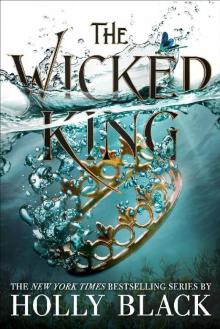 The Wicked King (The Folk of the Air #2)
The Wicked King (The Folk of the Air #2)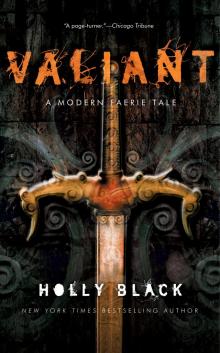 Valiant
Valiant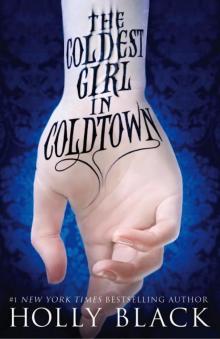 The Coldest Girl in Coldtown
The Coldest Girl in Coldtown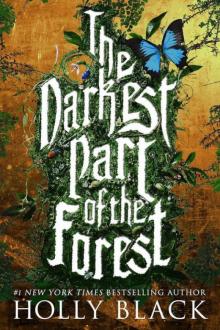 The Darkest Part of the Forest
The Darkest Part of the Forest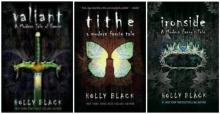 Tithe
Tithe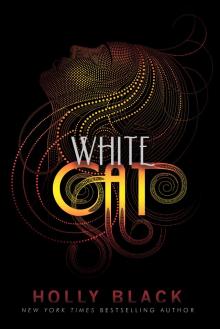 White Cat
White Cat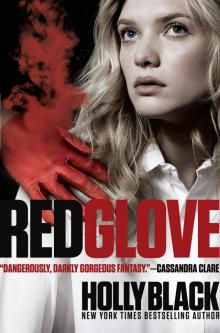 Red Glove
Red Glove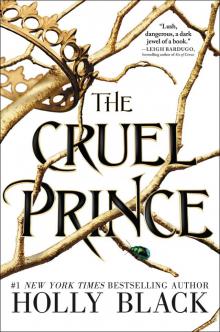 The Cruel Prince
The Cruel Prince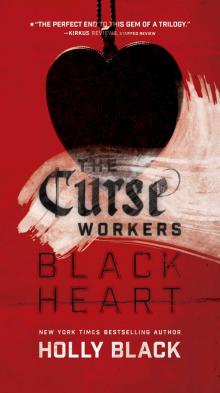 Black Heart
Black Heart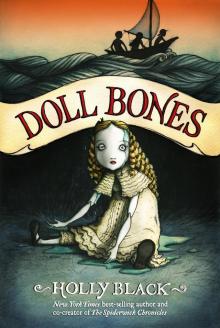 Doll Bones
Doll Bones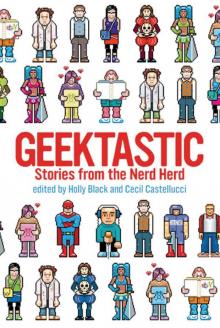 Geektastic: Stories from the Nerd Herd
Geektastic: Stories from the Nerd Herd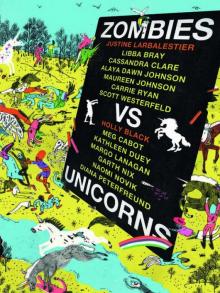 Zombies Vs. Unicorns
Zombies Vs. Unicorns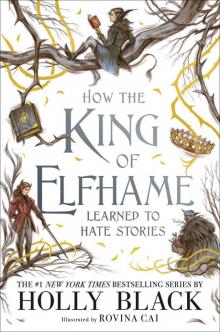 How the King of Elfhame Learned to Hate Stories
How the King of Elfhame Learned to Hate Stories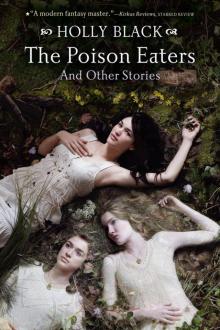 The Poison Eaters and Other Stories
The Poison Eaters and Other Stories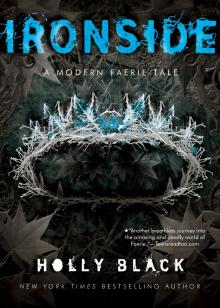 Ironside
Ironside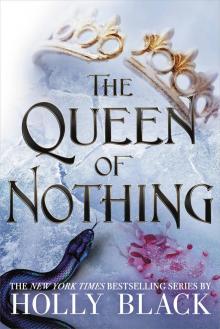 The Queen of Nothing
The Queen of Nothing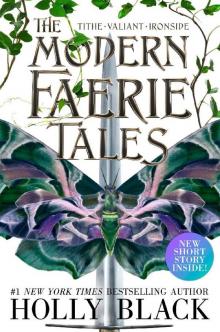 Modern Faerie Tales
Modern Faerie Tales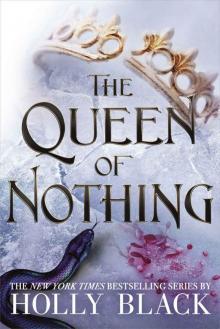 The Queen of Nothing (The Folk of the Air #3)
The Queen of Nothing (The Folk of the Air #3)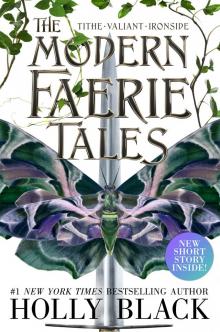 The Modern Faerie Tales
The Modern Faerie Tales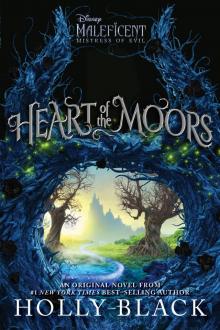 Heart of the Moors
Heart of the Moors The Golden Tower
The Golden Tower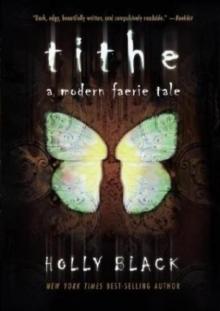 Tithe mtof-1
Tithe mtof-1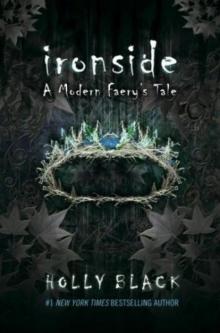 Ironside mtof-3
Ironside mtof-3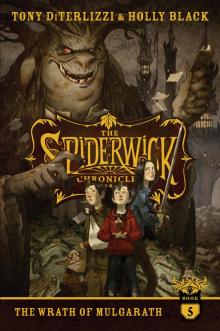 The Wrath of Mulgarath
The Wrath of Mulgarath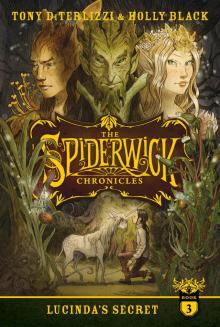 Lucinda's Secret
Lucinda's Secret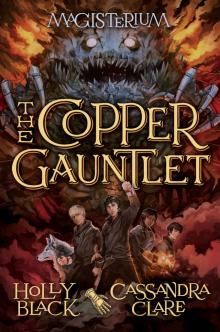 The Copper Gauntlet
The Copper Gauntlet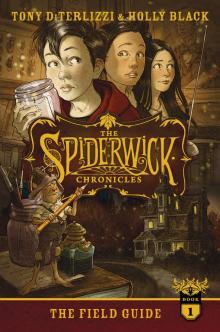 The Field Guide
The Field Guide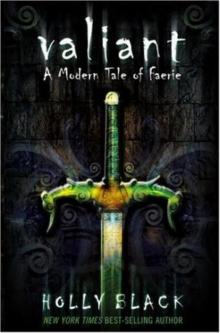 Valiant mtof-2
Valiant mtof-2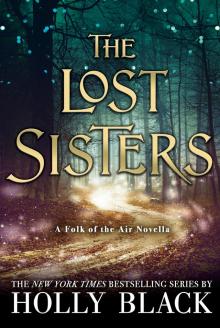 The Lost Sisters
The Lost Sisters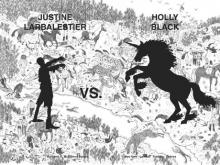 Zombies vs. Unicorns
Zombies vs. Unicorns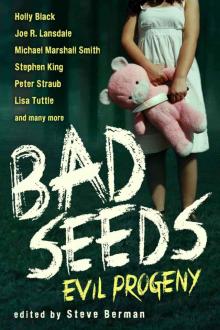 Bad Seeds: Evil Progeny
Bad Seeds: Evil Progeny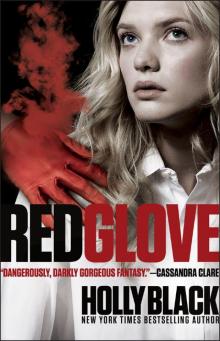 Red Glove (2)
Red Glove (2)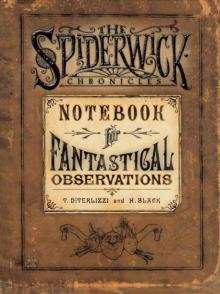 Notebook for Fantastical Observations
Notebook for Fantastical Observations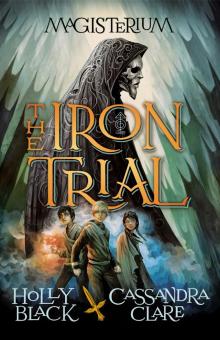 The Iron Trial
The Iron Trial Welcome to Bordertown
Welcome to Bordertown